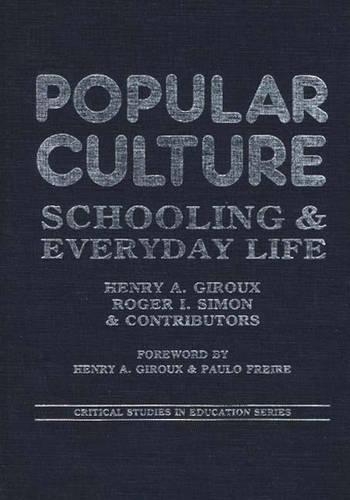
Popular Culture: Schooling and Everyday Life
(Hardback)
Publishing Details
Popular Culture: Schooling and Everyday Life
By (Author) Stanley Aronowitz
By (author) Robert W. Connell
By (author) Philip Corrigan
By (author) Elizabeth Ellsworth
By (author) Henry A. Giroux
By (author) Lawrence Grossberg
By (author) Peter McLaren
By (author) Roger Simon
By (author) Paul Smith
By (author) Richard Smith
Bloomsbury Publishing PLC
Praeger Publishers Inc
28th July 1989
United States
Classifications
Tertiary Education
Non Fiction
Anthropology
306
Physical Properties
Hardback
256
Description
Illuminating one of the most pervasive issues of our time, Popular Culture is the first book to link the importance and implications of popular culture with pedagogical practice. It shows how cultural forms such as Hollywood films, pop music, soap operas, and televangelism are organized by gender, age, class, race, and ethnicity, thus providing the contradictory text that both enables and disables emancipatory interest, so fundamental to the formation of self and society. What emerges is a redefinition of the very notion of popular culture.
Reviews
The editors have brought together leading radical sociologists, educators, and others to discuss working-class popular culture, critical pedagogy, and the possibilities of school-related social reconstruction. Whether the book succeeds in providing the pedagogical grounds for radicalizing the emancipatory possibilities of teaching and learning, ' is a discourse that represents a political as well as a pedagogical project.' The overall tone is thoughtfully restrained, yet urgent--not stridently polemical as in conventional neo-Marxist tracts. This is a contribution to critical, normative, and interpretive educational scholarship. Interpretations of rock 'n' roll (e.g., Springsteen's work), television situation comedies (The Honeymooners'), and, especially, Hollywood movies (Dirty Dancing) are most helpful in demonstrating the efficacy of popular culture. Quality of the writing ranges from jargonized critical theorizing to trenchant analyses of popular art' (Paul Willis), televangelism (Peter McLaren and Richard Smith), romance' programs on TV (Mimi White), and working-class life-style (Stanley Aronowitz). E.D. Hirsch Jr. (Cultural Literacy) and Allan Bloom (The Closing of the American Mind) may have met their match in this strategically crafted case for the expansion of social democracy in post industrial society. Copious chapter references and occasional photographs, and an index. Graduate level.-Choice
"The editors have brought together leading radical sociologists, educators, and others to discuss working-class popular culture, critical pedagogy, and the possibilities of school-related social reconstruction. Whether the book succeeds in providing the pedagogical grounds for radicalizing the emancipatory possibilities of teaching and learning, ' is a discourse that represents a political as well as a pedagogical project.' The overall tone is thoughtfully restrained, yet urgent--not stridently polemical as in conventional neo-Marxist tracts. This is a contribution to critical, normative, and interpretive educational scholarship. Interpretations of rock 'n' roll (e.g., Springsteen's work), television situation comedies (The Honeymooners'), and, especially, Hollywood movies (Dirty Dancing) are most helpful in demonstrating the efficacy of popular culture. Quality of the writing ranges from jargonized critical theorizing to trenchant analyses of popular art' (Paul Willis), televangelism (Peter McLaren and Richard Smith), romance' programs on TV (Mimi White), and working-class life-style (Stanley Aronowitz). E.D. Hirsch Jr. (Cultural Literacy) and Allan Bloom (The Closing of the American Mind) may have met their match in this strategically crafted case for the expansion of social democracy in post industrial society. Copious chapter references and occasional photographs, and an index. Graduate level."-Choice
Author Bio
HENRY GIROUX, Professor and Scholar in Residence in the School of Education at Miami University, Ohio, is known internationally for his work in critical pedagogy and has published eleven books on the subject. ROGER SIMON is Associate Professor in the Department of Curriculum at the Ontario Institute for Studies in Education. He is currently working on his next book, Teaching Against the Grain: A Pedagogy of Possibility.
